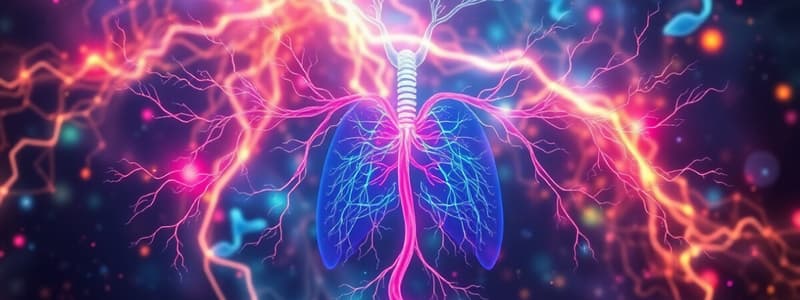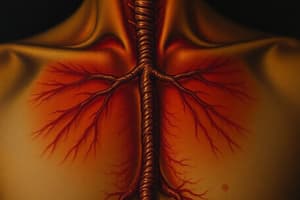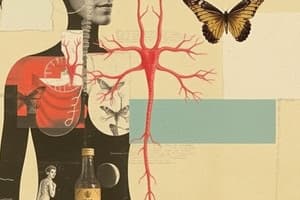Podcast
Questions and Answers
What is the primary function of the endocrine system?
What is the primary function of the endocrine system?
- Transportation of oxygen in the blood
- Protection against external pathogens
- Homeostasis and maintaining internal balance (correct)
- Regulation of muscular strength
Which of the following is NOT a function of hormones secreted by the endocrine glands?
Which of the following is NOT a function of hormones secreted by the endocrine glands?
- Regulating metabolism
- Enhancing cognitive abilities (correct)
- Facilitating immune response
- Controlling muscle contraction
Which of the following glands is part of the endocrine system?
Which of the following glands is part of the endocrine system?
- Thyroid gland
- Pancreas
- Pituitary gland
- All of the above (correct)
The major role of hormones in the body includes which of the following?
The major role of hormones in the body includes which of the following?
Which of the following best describes the concept of homeostasis as it relates to the endocrine system?
Which of the following best describes the concept of homeostasis as it relates to the endocrine system?
Which of the following best describes the primary role of the endocrine system?
Which of the following best describes the primary role of the endocrine system?
What type of glands make up the endocrine system?
What type of glands make up the endocrine system?
Hormones are best described as which of the following?
Hormones are best described as which of the following?
Which disorder results from an excess of a certain hormone?
Which disorder results from an excess of a certain hormone?
Which of the following processes is directly influenced by hormones?
Which of the following processes is directly influenced by hormones?
What is the consequence of hormonal imbalance in the endocrine system?
What is the consequence of hormonal imbalance in the endocrine system?
Which gland is NOT a part of the endocrine system?
Which gland is NOT a part of the endocrine system?
What is the primary role of follicle stimulating hormone (FSH) in the body?
What is the primary role of follicle stimulating hormone (FSH) in the body?
Which hormone is primarily responsible for stimulating the production of testosterone in males?
Which hormone is primarily responsible for stimulating the production of testosterone in males?
What is the main function of calcitonin in the body?
What is the main function of calcitonin in the body?
What type of hormones are produced by the adrenal cortex?
What type of hormones are produced by the adrenal cortex?
How does parathormone (PTH) primarily function in the body?
How does parathormone (PTH) primarily function in the body?
What is the primary function of Growth Hormone (GH) in adults?
What is the primary function of Growth Hormone (GH) in adults?
Which hormone secreted by the anterior pituitary is responsible for stimulating lactation?
Which hormone secreted by the anterior pituitary is responsible for stimulating lactation?
What is the role of the Thyroid Stimulating Hormone (TSH)?
What is the role of the Thyroid Stimulating Hormone (TSH)?
Which hormone is involved in the negative feedback system with the hypothalamus?
Which hormone is involved in the negative feedback system with the hypothalamus?
Which of the following hormones is produced by the posterior pituitary?
Which of the following hormones is produced by the posterior pituitary?
What do Gonadotrophins primarily influence?
What do Gonadotrophins primarily influence?
What is the relationship between the pituitary gland and the hypothalamus?
What is the relationship between the pituitary gland and the hypothalamus?
Which hormone stimulates the adrenal cortex to increase cortisol output?
Which hormone stimulates the adrenal cortex to increase cortisol output?
What is the purpose of negative feedback regulation in the endocrine system?
What is the purpose of negative feedback regulation in the endocrine system?
Which of the following is NOT a function of Growth Hormone?
Which of the following is NOT a function of Growth Hormone?
Flashcards
Endocrine System
Endocrine System
A network of glands that produce hormones that regulate various body functions.
Homeostasis
Homeostasis
The state of balance maintained within the body's internal environment.
Hormones
Hormones
Chemical messengers produced by endocrine glands that travel through the bloodstream.
Pituitary Gland
Pituitary Gland
Signup and view all the flashcards
Hypothalamus
Hypothalamus
Signup and view all the flashcards
Negative Feedback
Negative Feedback
Signup and view all the flashcards
Growth Hormone (GH)
Growth Hormone (GH)
Signup and view all the flashcards
Prolactin
Prolactin
Signup and view all the flashcards
Thyroid Stimulating Hormone (TSH)
Thyroid Stimulating Hormone (TSH)
Signup and view all the flashcards
Adrenocorticotrophic Hormone (ACTH)
Adrenocorticotrophic Hormone (ACTH)
Signup and view all the flashcards
Follicle Stimulating Hormone (FSH)
Follicle Stimulating Hormone (FSH)
Signup and view all the flashcards
Luteinising Hormone (LH)
Luteinising Hormone (LH)
Signup and view all the flashcards
Oxytocin
Oxytocin
Signup and view all the flashcards
Antidiuretic Hormone (ADH)
Antidiuretic Hormone (ADH)
Signup and view all the flashcards
Thyroid Gland
Thyroid Gland
Signup and view all the flashcards
Thyroxine (T4)
Thyroxine (T4)
Signup and view all the flashcards
Triiodothyronine (T3)
Triiodothyronine (T3)
Signup and view all the flashcards
Calcitonin
Calcitonin
Signup and view all the flashcards
Parathyroid Glands
Parathyroid Glands
Signup and view all the flashcards
Parathormone (PTH)
Parathormone (PTH)
Signup and view all the flashcards
Adrenal Glands
Adrenal Glands
Signup and view all the flashcards
Cortisol
Cortisol
Signup and view all the flashcards
Aldosterone
Aldosterone
Signup and view all the flashcards
Insulin
Insulin
Signup and view all the flashcards
Glucagon
Glucagon
Signup and view all the flashcards
Estrogen & Progesterone
Estrogen & Progesterone
Signup and view all the flashcards
Testosterone
Testosterone
Signup and view all the flashcards
Thymosin
Thymosin
Signup and view all the flashcards
Melatonin
Melatonin
Signup and view all the flashcards
Study Notes
### The Endocrine System - Homeostasis
- The endocrine system is responsible for maintaining homeostasis, the balance of the body's internal environment.
- It works alongside the autonomic nervous system (ANS) to regulate internal processes.
- ANS is responsible for rapid changes, while the endocrine system manages slower changes.
### The Endocrine Glands
- The endocrine system is made up of ductless glands that secrete hormones directly into the bloodstream.
- The glands include:
- Pituitary gland
- Adrenal glands
- Pancreatic islets
- Pineal gland
- Thyroid gland
- Thymus
- Parathyroid glands
- Ovaries (female)
- Testes (male)
Hormone Functions
- Hormones are chemical messengers that regulate various processes, including:
- Growth and development
- Stress response
- Nutrition
- Reproduction
### Disorders of the Endocrine System
- Disruptions in the endocrine system stem from hormone imbalances (too much or too little):
- Hyper: Excess hormone production
- Hypo: Deficient hormone production
- Examples:
- Hypoglycemia: Low blood sugar
- Hyperthyroidism: Excess thyroxine
### Clinical Importance
- Understanding the endocrine system is critical for:
- Recognizing oral and clinical presentations of endocrine diseases
- Managing medical emergencies related to endocrine disorders
- Understanding patient behavior related to endocrine conditions
### Pituitary Gland and Hypothalamus
- Pituitary gland, located in the sphenoid bone, is connected to the hypothalamus via a stalk.
- Hypothalamus and pituitary gland operate as the negative feedback regulation system.
### Hypothalamus Hormones
- The hypothalamus secretes several hormones, including:
- Growth hormone releasing hormone (GHRH)
- Growth hormone release inhibiting hormone (GHIH)
- Thyrotrophin releasing hormone (TRH)
- Corticotrophin releasing hormone (CRH)
- Prolactin releasing hormone (PRH)
- Prolactin inhibiting hormone (PIH)
- Luteinising releasing hormone (LHRH)
- Gonadotrophin releasing hormone (GnRH)
### Pituitary Gland Hormones - Anterior Pituitary
- The anterior pituitary secretes:
- Growth Hormone (GH): Promotes growth of various body parts (skeleton, muscles, connective tissues)
- Prolactin: Stimulates lactation (milk production)
- Thyroid Stimulating Hormone (TSH): Stimulates thyroid growth and activity
- Adrenocorticotrophic Hormone (ACTH): Stimulates adrenal cortex activity
- Gonadotrophins:
- Follicle stimulating hormone (FSH)
- Luteinising hormone (LH)
### Pituitary Gland Hormones - Posterior Pituitary
- The posterior pituitary secretes:
- Oxytocin: Promotes uterine contractions and milk production
- Antidiuretic Hormone (ADH, Vasopressin): Regulates water reabsorption by kidneys, influences blood pressure
### Thyroid Gland
- Situated in the neck, in front of the larynx and trachea.
- Secretes three hormones:
- Thyroxine (T4)
- Triiodothyronine (T3)
- Calcitonin
- Iodine is essential for thyroid hormone production.
### Thyroid Hormone Functions (T4 & T3)
- Regulate:
- Basal metabolic rate (energy expenditure)
- Carbohydrate, protein and lipid metabolism (weight)
- Female reproductive cycle and lactation
- Nervous system
- Cardiovascular system
- Motility of the gastrointestinal tract (peristalsis)
### Calcitonin Function
- Regulates blood calcium levels by:
- Reducing blood calcium levels
- Storing calcium in bones
- Excreting calcium via kidneys
- Calcitonin opposes the effects of parathormone.
- It is released in response to elevated blood calcium levels after meals.
### Parathyroid Glands
- Four small glands embedded in the thyroid gland (two per lobe).
- Produce parathormone (PTH), crucial for maintaining blood calcium levels.
### Parathormone Function
- Works with calcitonin to maintain blood calcium levels.
- Raises blood calcium by influencing:
- Calcium absorption in the small intestine
- Calcium reabsorption by the kidneys
- If dietary calcium is inadequate, PTH can stimulate calcium release from the skeletal system.
### Importance of Calcium
- Calcium is essential for:
- Muscle contraction
- Nerve impulse transmission
- Blood clotting
### Adrenal Glands
- Located atop each kidney, approximately 4cm long and 3cm wide.
- Composed of two parts:
- Cortex (outer part): Essential for life
- Medulla (inner part)
### Adrenal Gland Function
- Cortex: Produces:
- Glucocorticoids: Regulate glucose metabolism (e.g., cortisol)
- Mineralocorticoids: Regulate electrolyte balance (e.g., aldosterone)
- Sex steroids: Influence sexual development (e.g., androgens)
- Medulla: Produces:
- Catecholamines: Respond to stress (e.g., epinephrine, norepinephrine)
### Pancreatic Islets
- Clusters of cells within the pancreas that produce hormones.
- Secretes:
- Insulin: Reduces blood glucose levels
- Glucagon: Increases blood glucose levels
- Somatostatin: Inhibits insulin and glucagon secretion
### Insulin Function
- Regulates blood glucose levels and other nutrients.
- Reduces blood glucose by:
- Stimulating glucose uptake and utilization by muscle and connective tissues.
- Promoting glucose storage by increasing glucose conversion into glycogen (primarily in the liver and skeletal muscles).
### Glucagon Function
- Increases blood glucose levels by:
- Converting glycogen into glucose (glycogenolysis)
- Stimulating gluconeogenesis (producing new glucose from sources like proteins)
### Hormones Secretion by Ovaries and Testes
- Ovaries (female):
- Estrogen & Progesterone: Regulate the menstrual cycle, initiate sexual maturity
- Testes (male):
- Testosterone: Produces spermatozoa, promotes sexual maturity, secondary sexual characteristics.
### Thymus Gland
- Located behind the sternum in the chest.
- Secretes Thymosin: essential for the development of T-lymphocytes for cell-mediated immunity.
### Thymosin Function
- Responsible for the growth and maturation of the thymus and other lymph tissues.
- Thymosin production declines with age, leading to a decrease in T-lymphocyte effectiveness.
### Pineal Gland
- Small gland (about 10mm long).
- Secretes Melatonin:
- Contributes to the coordination of circadian rhythms (24-hour cycles)
- May influence the hypothalamus.
- Its secretion is suppressed by daylight.
Studying That Suits You
Use AI to generate personalized quizzes and flashcards to suit your learning preferences.
Related Documents
Description
Explore the crucial role of the endocrine system in maintaining homeostasis in the body. This quiz covers the main endocrine glands, their functions, and the disorders that arise from hormonal imbalances. Test your knowledge on how hormones regulate growth, reproduction, and stress responses.




